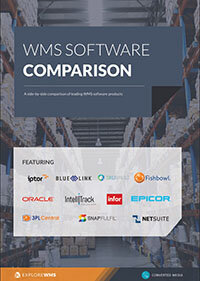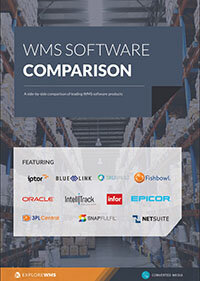Which industries use WMS the most?
Take a quick jaunt around the websites of leading WMS providers and you’ll realize that hundreds of thousands of companies, if not millions, are using a WMS right now. While a substantial portion stick to the key features and don’t have odd requirements, there are other groups with complex needs and regulatory concerns.
These WMS industries paint an interesting picture of how the technology landscape is evolving and why you might be getting a new feature in your next WMS update. We’ve browsed the data and industry-specific WMS development to find six examples of high-use WMS industries.
Manufacturing
Manufacturers have some of the more complicated warehouse requirements, making a WMS a necessity. Their operations include a mix of pre-existing goods and newly created goods combined in a variety of ways.
You may have a manufacturer who combines parts to make a new product, giving SKUs to each part along the way as well as each new final product. The WMS works with ERP tools to maintain proper inventory levels and to keep production running smoothly. There’s also a feedback loop based on product orders and returns where a WMS is invaluable for a company knowing how much to make and when to slow or speed up their production lines.
Consumer goods and retail
Brick-and-mortar retailers are increasing their adoption of complex WMS in order to keep pace with changing customer demands. Today, more individual store locations (and their small stockrooms) are operating as dual-purpose warehouses, where they stock inventory for purchase in-store and also are locally filling online orders either with in-store pickup or direct shipping.
The WMS also needs to know how to handle an order from a large warehouse to a small retail location, keeping inventory counts accurate as goods are physically moved but not taken out of the system.
These changes impact all kinds of consumer goods which are increasing in their demand for flexible fulfillment options as well as more traditional order management, vendor compliance, labor management, yard and dock door tools, and store delivery confirmations.
Food and beverage
Food and beverage companies (often manufacturers of these items) are a specialty category for many WMS companies. This occurs because of the significant food and beverage needs for keeping goods fresh. Products must be shipped within certain times, can’t spoil in the warehouse or on the retail shelf, and usually need to be kept at specific temperatures.
Out of necessity to protect products and their bottom line, food and beverage almost always tops WMS industries usage lists.
Third-party logistics (3PL) companies
The business of a 3PL is to manage the logistics and orders of others, making the warehouse a core operational functionality. So, you’ll almost always find a WMS in use by a 3PL. Most WMS providers have packages designed for the complex nature of a 3PL warehouse, with a variety of products, owners, vendors, and order systems that must be kept separate and operational.
We also see a growing trend of 3PLs taking a baseline WMS and then building their own modules and functionality on top, customizing it as they need. By doing this and creating customer-specific dashboards, the 3PL can give its clients reports and metrics while still controlling the data.
Wholesale distributors
Wholesalers also rely on WMS to manage their complex supply chains and orders. Warehouse tools allow them to maximize their inventory deployment, get orders out faster with cross-docking and advanced picking features, and control one of their biggest costs: labor.
Any large wholesaler will need a WMS to balance inventory and shipment speeds while maintaining high order accuracy. Plus, WMS features can help them protect their equipment, stick to maintenance schedules, and optimize warehouse layout and picking routes so there’s minimal risk of accidents.
It’s one of the required WMS industries.
Health and hospital care
We’ll demonstrate a final thought on WMS industries by introducing an area few think about: health and hospitals. These facilities may not always be large inventories or warehouses, but they have complex needs.
Here are just a few:
- Some medications or equipment will have specific storage requirements.
- Many drugs have tight distribution controls and require audits
- Materials can expire and using them afterward can threaten lives
- Strict permissions about who may access which items
- Regulations can limit resupply activities
- Storage requirements are often very specific and may prevent some warehouse layout
- There’s always a lot of paperwork with each and every activity
Any highly regulated industry is one that can benefit from an industry-specific WMS. While individually they may not be major users of WMS, together they represent a sizable portion of business for many of the world’s leading providers.
Free white paper

WMS comparison guide
Your hand-picked comparison of leading WMS software vendors.

Related articles
-

Drone delivery: how far away are we, really?
Round up of developments in drone delivery with an emphasis on commercial drones and legislation
-

Mission-critical features of food lot traceability software
What features of food traceability software will help you during a food recall
-

Supply Vision launches new version of its TMS
Chicago-based logistics software provider launches Supply Vision 3.0

